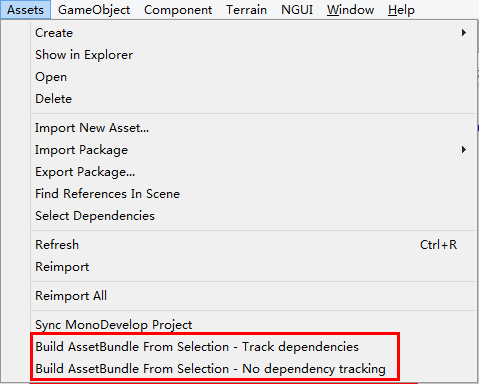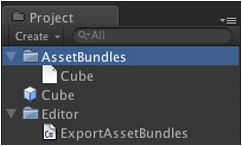在一个Unity项目中,发布包本身不一定要包括所有的Asset(译为资产或组件),其它的部分可以单独发布为.unity3d,再由程序从本地/远程加载执行,这部分不在本文讨论范围。虽然Unity并没有直接提供.unity3d的导出功能,但可以通过其手册了解到一些,并打开菜单项。
翻看Unity关于AssetBundle的手册,有相关的链接:
【注意】导出.unity3d格式需要pro版本,非pro版本可以打开菜单项,但导出时会提示错误:
我们可以使用Untiy提供的现成的脚本打开两个导出.unity3d的菜单项,也可以使用API根据自己的需求来写。当项目变得越来越大时,手工导出AssetBundle会越来越吃力,这时可能就需要自己来开发导出功能,自动创建AssetBundle了。
打开菜单项
在Unity中创建名为ExprotAssetBundles的C#脚本,放到Editor目录下(必须是这个目录,以便在编辑器中生效)。把下面的代码复制到ExprotAssetBundles脚本中(可以在Building AssetBundles中找到这段代码)
1 // C# Example
2 // Builds an asset bundle from the selected objects in the project view.
3 // Once compiled go to "Menu" -> "Assets" and select one of the choices
4 // to build the Asset Bundle
5
6 using UnityEngine;
7 using UnityEditor;
8 public class ExportAssetBundles {
9 [MenuItem("Assets/Build AssetBundle From Selection - Track dependencies")]
10 static void ExportResource () {
11 // Bring up save panel
12 string path = EditorUtility.SaveFilePanel ("Save Resource", "", "New Resource", "unity3d");
13 if (path.Length != 0) {
14 // Build the resource file from the active selection.
15 Object[] selection = Selection.GetFiltered(typeof(Object), SelectionMode.DeepAssets);
16 BuildPipeline.BuildAssetBundle(Selection.activeObject, selection, path, BuildAssetBundleOptions.CollectDependencies | BuildAssetBundleOptions.CompleteAssets);
17 Selection.objects = selection;
18 }
19 }
20 [MenuItem("Assets/Build AssetBundle From Selection - No dependency tracking")]
21 static void ExportResourceNoTrack () {
22 // Bring up save panel
23 string path = EditorUtility.SaveFilePanel ("Save Resource", "", "New Resource", "unity3d");
24 if (path.Length != 0) {
25 // Build the resource file from the active selection.
26 BuildPipeline.BuildAssetBundle(Selection.activeObject, Selection.objects, path);
27 }
28 }
29 }
这时,在Assets菜单下可以看到两个新的菜单项:

1. Build AssetBundle From Selection - Track dependencies
这个选项会把当前对象打包到一个asset bundle中,并包含所有依赖。
2.
Build AssetBundle From Selection - No dependency tracking
与前一个相反的选项,只包含所选的asset
例:创建一个Cube,拖拽生成一个预置体。右键点击预置体,选择
"Build AssetBundle From Selection - Track dependencies"
,这时可以看到.unity3d的保存窗口。在项目中创建一个名为AssetBundles的目录,并把选中的预置体存为Cube.unity3d,可以看到窗口显示如下:
 现在,就可以把Cube.unity3d放到任意位置,或自己的服务器上。
现在,就可以把Cube.unity3d放到任意位置,或自己的服务器上。
如何在创建组件包时修改属性
可以在调用 BuildPipeline.BuildAssetBundle以后使用 AssetDatabase.ImportAsset来强制导入组件,然后用 AssetPostprocessor.OnPreprocessTexture来设置需要的属性。
下面的示例来展示构建组件包时如何设置不同的纹理贴图。
1 // Builds an asset bundle from the selected objects in the project view,
2 // and changes the texture format using an AssetPostprocessor.
3
4 using UnityEngine;
5 using UnityEditor;
6
7 public class ExportAssetBundles {
8
9 // Store current texture format for the TextureProcessor.
10 public static TextureImporterFormat textureFormat;
11
12 [MenuItem("Assets/Build AssetBundle From Selection - PVRTC_RGB2")]
13 static void ExportResourceRGB2 () {
14 textureFormat = TextureImporterFormat.PVRTC_RGB2;
15 ExportResource();
16 }
17
18 [MenuItem("Assets/Build AssetBundle From Selection - PVRTC_RGB4")]
19 static void ExportResourceRGB4 () {
20 textureFormat = TextureImporterFormat.PVRTC_RGB4;
21 ExportResource();
22 }
23
24 static void ExportResource () {
25 // Bring up save panel.
26 string path = EditorUtility.SaveFilePanel ("Save Resource", "", "New Resource", "unity3d");
27
28 if (path.Length != 0) {
29 // Build the resource file from the active selection.
30 Object[] selection = Selection.GetFiltered(typeof(Object), SelectionMode.DeepAssets);
31
32 foreach (object asset in selection) {
33 string assetPath = AssetDatabase.GetAssetPath((UnityEngine.Object) asset);
34 if (asset is Texture2D) {
35 // Force reimport thru TextureProcessor.
36 AssetDatabase.ImportAsset(assetPath);
37 }
38 }
39
40 BuildPipeline.BuildAssetBundle(Selection.activeObject, selection, path, BuildAssetBundleOptions.CollectDependencies | BuildAssetBundleOptions.CompleteAssets);
41 Selection.objects = selection;
42 }
43 }
44 }
45
46 // Changes the texture format when building the Asset Bundle.
47 using UnityEngine;
48 using UnityEditor;
49 public class TextureProcessor : AssetPostprocessor
50 {
51 void OnPreprocessTexture() {
52 TextureImporter importer = assetImporter as TextureImporter;
53 importer.textureFormat = ExportAssetBundles.textureFormat;
54 }
55 }
也可以使用AssetDatabase.ImportAssetOptions.来控制如何导入组件。
首发地址: http://www.cnblogs.com/basecn/archive/2013/05/20/3264297.html






















 1566
1566

 被折叠的 条评论
为什么被折叠?
被折叠的 条评论
为什么被折叠?








